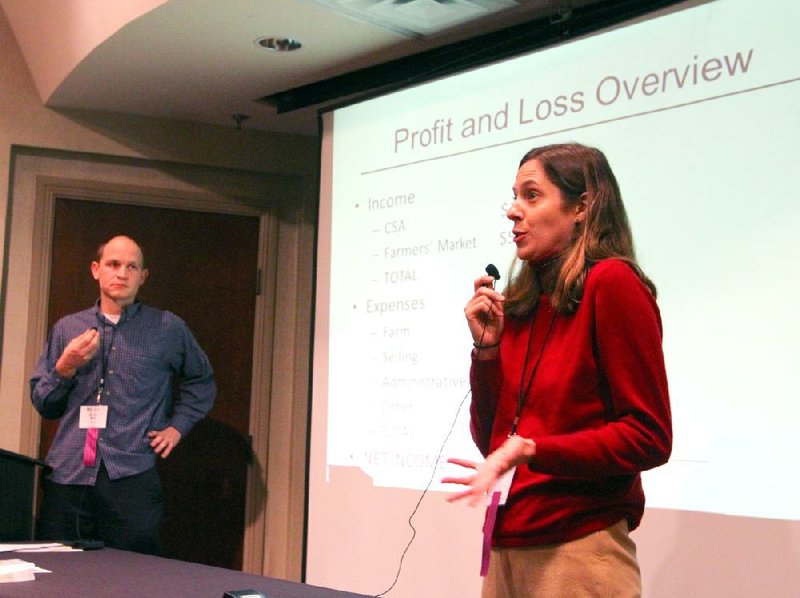LITTLE ROCK — Emily Oakley and Michael Appel decided they wanted to have their own farm, so they set out to buy land.
They couldn’t get loans from the U.S. Department of Agriculture or a bank.
“We were laughed out of the [Farm Service Agency office] when we told the loan officer we wanted money for [a few acres] to make a living on,” Appel said.
So the couple saved nearly $100,000 over three years and bought land in Cherokee County, Okla.
“It wasn’t easy, but it was the lifestyle we wanted,” Appel said.
That was seven years ago, and now they are educating others on how to get started. They spoke Friday morning at the Fayetteville-based Southern Sustainable Agriculture Working Group conference at the Peabody Little Rock hotel.
About 1,200 people registered for the two-day conference, which ends today. Some arrived Thursday to attend field trips around Little Rock to learn the ways in which sustainable farms operate in the area.
Sustainable farming doesn’t use herbicides and pesticides, promotes environmental quality, makes efficient use of nonrenewable resources and strives to sustain the economic viability of farm operations.
Speaking to a crowd of about 150, Appel said he got into organic farming in California before moving to Oklahoma with his wife to start a farm. At first, the two could only lease 3 acres near Tulsa, where they started growing vegetables to sell at a farmers market.
They participate in what is known as community-sup- ported agriculture, which allows people to buy shares of the crop before the growing season. When the crops are harvested, shareholders get vegetables every week.
“It’s a way to share the risk with a group of people,” Appel said.
After three years of leasing land, Appel and Oakley had saved nearly $100,000 and bought a parcel they dubbed Three Springs Farm about 20 miles from the Oklahoma/Arkansas state line.
On average, Oakley and Appel get $75,000 from the investors and the sale of produce at market. With average expenses of $30,000, their net profit is about $45,000.
“It may not sound like much,” Oakley said, “but it’s exactly what we want out of the farm.”
Only 5 percent of U.S. farmers are 25 to 35 years old, compared with 30 percent who are least 60 years old, according to the National Young Farmers’ Coalition.
Appel said he expects that will gradually change as older farmers retire and younger people get into agriculture. But, he noted, the challenge for young people is raising capital.
There is a bill working its way through Congress called the Beginning Farmer and Rancher Opportunity Act that would offer more funding for loans.
Fred Hoefner, policy director for the National Sustainable Agriculture Coalition, a lobbyist group in Washington, D.C., said the bill is in the early stages but he hopes it will be included in the 2012 Farm Bill.
The bill “would really help people who want to get into farming who don’t have the money to do it,” he said.
Other sessions at the conference were technical — ways to prevent deer from eating crops, how to identify good bugs from bad bugs and the importance of keeping financial records.
Steve Muntz, who owns a ranch in Kentucky, talked about what to know before raising animals.
“Do you want cattle, goats, pigs or a combination of animals?” Muntz asked. “Also consider what kind of grass you need, and whether there is enough shade for all the animals.”
Jim Lukens, executive director of the Southern Sustainable Agriculture Working Group, said he hoped people left the conference with the knowledge to start or maintain a profitable, sustainable farm.
Though there are no official numbers, Lukens said that “more and more people are getting into sustainable farming. We want to educate them in the right way to do it.”
Business, Pages 29 on 01/21/2012
